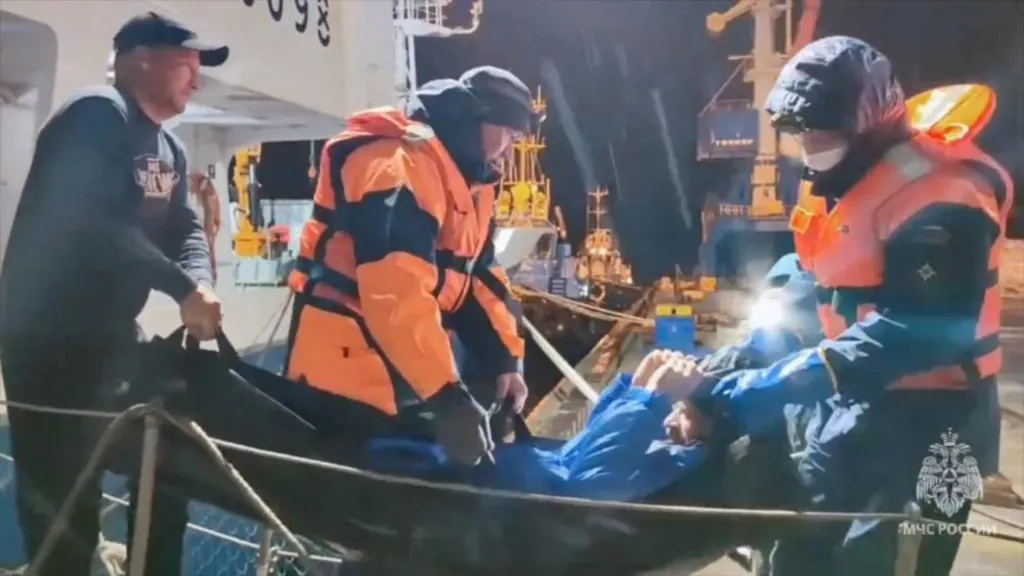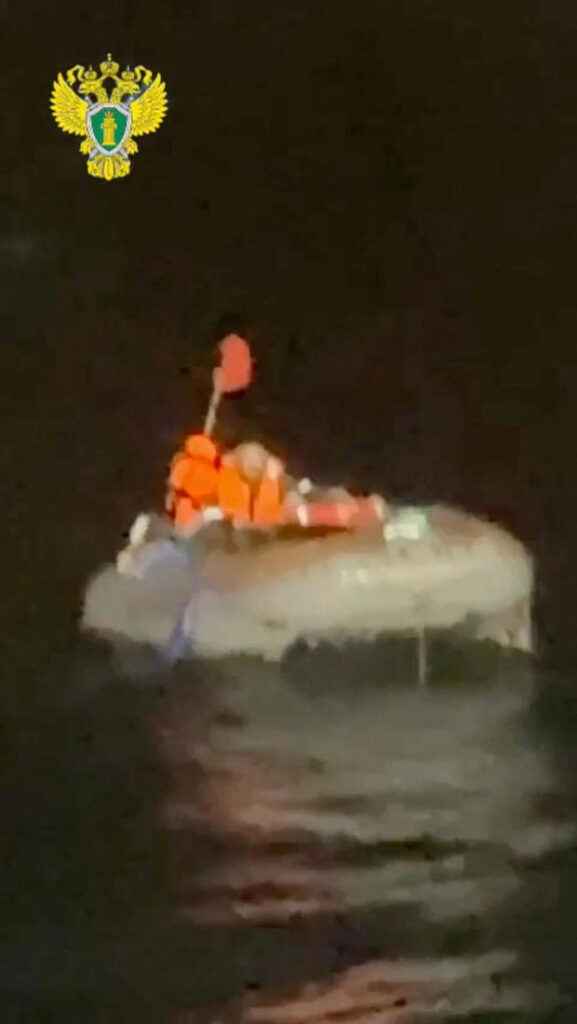When Mikhail Pichugin, 46, embarked on a seemingly straightforward whale-watching trip with his brother Sergei, 49, and nephew Ilya, 15, no one could have foreseen the ordeal awaiting them. It was early August when they set off into the unforgiving waters of the Sea of Okhotsk, off Russia’s far eastern coast. What began as a leisurely outing soon transformed into a harrowing struggle for survival, stretching over two long months. The tale that unfolded tested the limits of human endurance and illustrated the profound will to live.
The Journey Begins: A Simple Adventure Gone Awry
August 9th, 2024, marked the start of the ill-fated trip. The three ventured out in a small inflatable boat, armed with provisions intended for a short excursion—enough to last two weeks at most. However, misfortune struck swiftly; the boat’s engine failed on their way back, leaving them adrift and vulnerable in one of the coldest seas in East Asia. The situation quickly worsened when one of the oars broke, rendering the boat nearly impossible to control. Stranded without any means of propulsion, the trio was at the mercy of the sea.
Efforts by emergency services to locate them proved fruitless. Pichugin recounted how helicopters flew overhead, but hopes of rescue were dashed when they failed to notice the boat. Even their onboard phone, used initially for geolocation, soon became useless as its battery and power bank drained. The few emergency flares they possessed were expended in vain, unable to attract attention. Despair began to set in as days turned to weeks.

Survival Against the Odds
For the stranded trio, basic necessities such as food and fresh water became precious commodities. They scavenged for rainwater to quench their thirst and rationed their meager supplies of noodles and peas. Occasionally, they managed to catch fish, though it did little to stave off the pangs of hunger. The constant exposure to frigid temperatures added to their plight. Pichugin described how he tried to warm himself beneath a damp camel wool sleeping bag, saying, “You crawl under it, wiggle a little and get warm.”
Tragically, the harsh conditions took a toll on his loved ones. In September, Ilya succumbed to hypothermia and starvation. Sergei, likely suffering from both physical exhaustion and psychological strain, began to exhibit erratic behavior. He even attempted to jump off the boat at one point. With each passing day, Pichugin found himself alone, facing the devastating reality of their deaths. In a final act of respect and love, he tied their bodies to the boat, determined to keep them from being lost to the sea.
Read more : A 6,000-Year-Old Neolithic Longhouse In Poland Archaeologists Just Unearthed
A Miracle Rescue
After 67 grueling days adrift, Pichugin was finally spotted by a fishing vessel named Angel, about 11 nautical miles off the Kamchatka Peninsula—over 540 nautical miles from where the journey had begun. When the fishermen approached, they found a man barely recognizable from his former self, weakened, bearded, and dressed in a life jacket. “I have no strength left,” he reportedly shouted as he was brought aboard.
The physical toll was evident; doctors at a hospital in Magadan found him severely dehydrated and suffering from hypothermia, though he was in stable condition. He had lost nearly half his body weight over the course of the ordeal. Yet, despite the trauma, Pichugin remained lucid and attributed his survival to “God’s help,” quietly adding, “I simply had no choice, I had my mother and my daughter left at home.” His wife, Yekaterina, described his rescue as “some kind of miracle,” a sentiment echoed by many who learned of his story.
Aftermath and Investigation
As Pichugin recuperates, questions about the circumstances of the incident have emerged. Russia’s transport investigators have launched a probe to determine whether there were any breaches of safety regulations. The boat, now a key piece of evidence, is being inspected, and authorities are considering potential criminal charges. One significant question centers on the absence of a satellite phone, which could have provided a reliable means of communication in the remote waters of the Sea of Okhotsk.
The incident has also revived stories of other incredible survival tales at sea. Experts point to similar cases, such as the four Soviet soldiers who survived 49 days adrift in the Pacific Ocean in 1960, rescued by a U.S. aircraft carrier. Pichugin’s story stands as a modern-day testament to human resilience, a reminder of both the frailty and the strength that can emerge in extreme conditions.
What Can We Learn from This Ordeal?
This tragic yet inspiring account highlights the importance of being prepared for the unexpected, especially in remote or harsh environments. Here are some lessons that can be drawn from Pichugin’s ordeal:
- Always Overprepare: Even if the journey seems routine, packing extra food, water, and emergency supplies is crucial. A well-stocked emergency kit, including first aid, flares, and a satellite phone, can be the difference between life and death.
- Have Reliable Communication Equipment: In areas like the Sea of Okhotsk, satellite phones are more than a convenience; they’re a necessity. They provide a lifeline to rescuers when conventional phones fail.
- Mental Fortitude Is Key: Survival isn’t only about physical endurance; mental resilience is equally important. Pichugin’s determination to stay alive, even after witnessing the loss of his family members, speaks to the strength of the human spirit in the face of adversity.

A Glimmer of Hope Amid Tragedy
While Pichugin’s survival is nothing short of miraculous, it comes shadowed by the loss of his brother and nephew. As he continues his recovery, the scars—both physical and emotional—will likely remain. The incident serves as a stark reminder of nature’s unpredictability and the need for preparedness when venturing into the wild.
As the story continues to unfold and investigations proceed, the world can only hope that lessons learned from this tragic event will help prevent future occurrences. And for Pichugin, who was plucked from the brink of death, the path to healing may be long, but he carries with him a story of resilience that few can truly comprehend.
Final Thoughts: Never Take Safety for Granted
Mikhail Pichugin’s experience is a sobering reminder of how quickly an adventure can turn into a struggle for survival. If anything, his ordeal underscores the unpredictability of nature and the need to respect it. Next time you find yourself on a seemingly straightforward trip, whether on land or sea, remember that a little extra preparation can be life-saving.
Stay safe. Stay prepared. And if you ever find yourself facing impossible odds, remember Mikhail’s story—sometimes, sheer willpower and a little bit of luck are enough to bring you back home.
If this story inspired you, consider sharing it with friends to raise awareness about the importance of emergency preparedness. And for those who love the open sea, always double-check your safety gear before setting sail. You never know when it might save your life.

